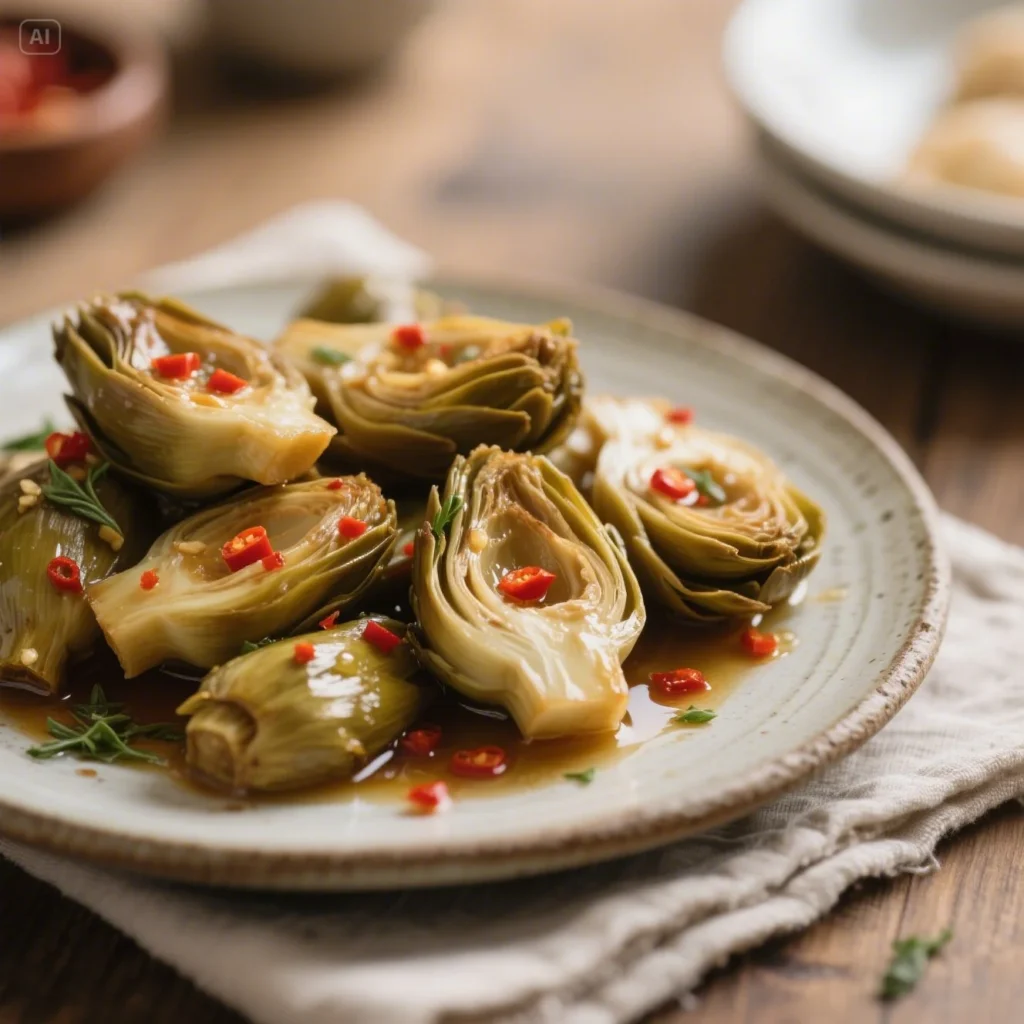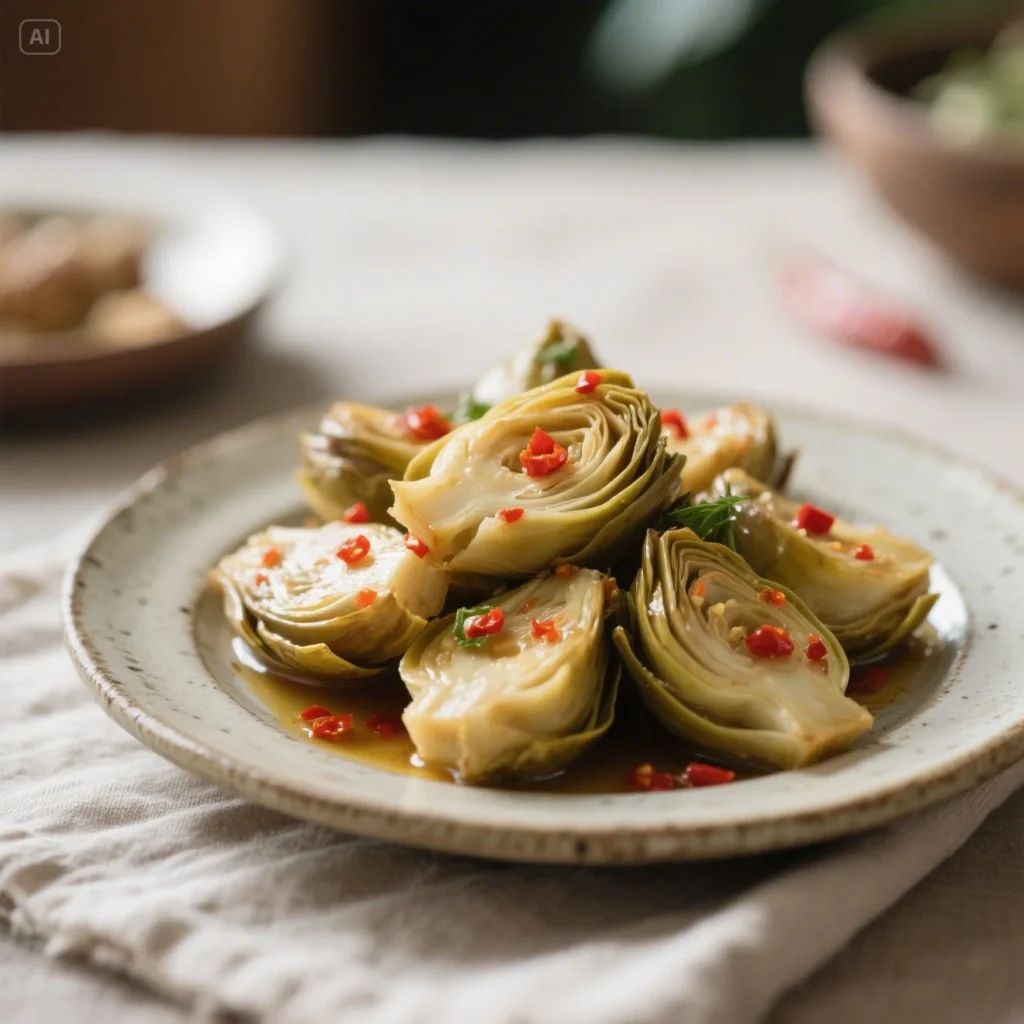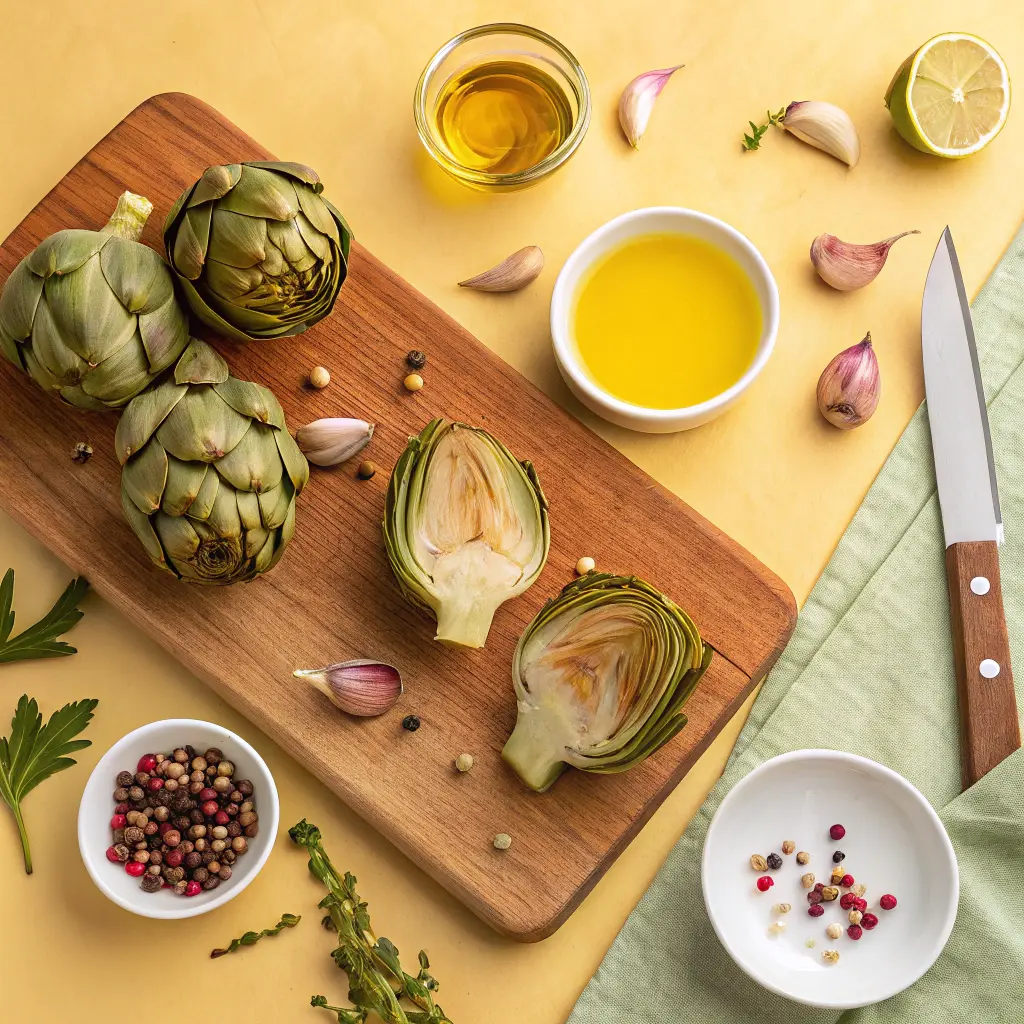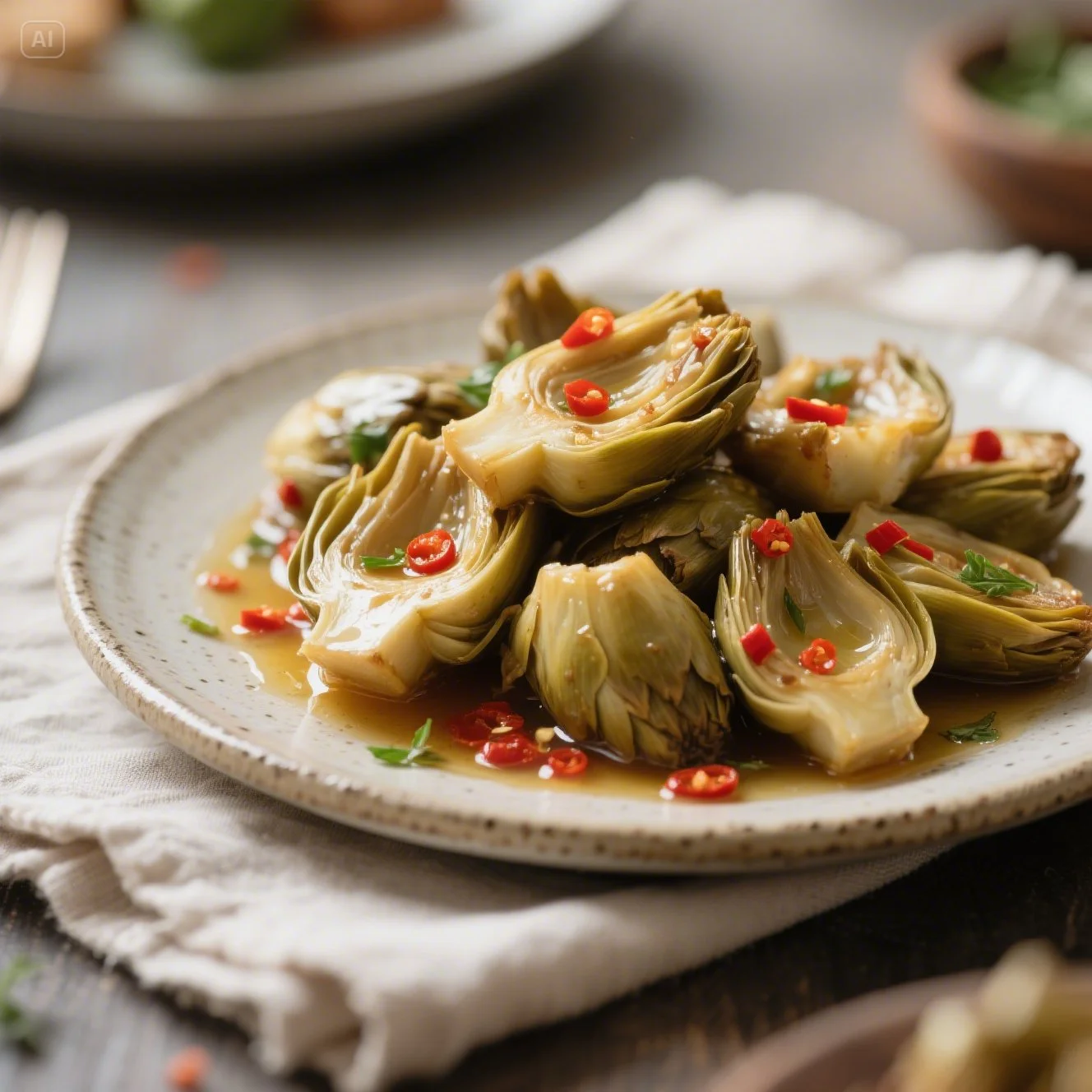Introduction
Love the tangy, flavorful bite of marinated artichoke hearts? These tender, briny gems are more than just a pantry staple, they’re a secret weapon for adding zest to meals in minutes. In this guide, you’ll learn how to make homemade marinated artichoke hearts that taste fresher, bolder, and more vibrant than anything from a store-bought jar.
Why make them at home?
- Better flavor: Control the herbs, spices, and acidity to match your taste.
- Cost-effective: A single batch costs half the price of premium store brands.
- No preservatives: Skip the additives and use simple, wholesome ingredients.
Ways to use them:
- Toss into pasta salads for a bright, tangy kick.
- Layer on charcuterie boards alongside cheeses and cured meats.
- Stir into dips or spread over toasted, crusty bread.
- Add to grain bowls or grilled chicken for a Mediterranean twist.
This easy marinated artichoke hearts recipe takes just 15 minutes of prep and uses ingredients you likely already have. Whether you’re a meal-prep enthusiast or a last-minute entertainer, these artichokes will become your go-to for elevating everyday dishes.
Ready to ditch the store-bought jars? Let’s dive into the simple steps for creating your own bold, briny, and utterly delicious marinated artichokes, no fancy skills required.
What Are Marinated Artichoke Hearts?

Marinated artichoke hearts are tender, edible portions of the artichoke plant preserved in a zesty blend of oil, vinegar, herbs, and spices. After the tough outer leaves and fuzzy choke are removed, the soft hearts are cooked (usually steamed or boiled) and then soaked in a flavorful marinade. This process infuses them with tangy, savory notes while keeping their delicate texture intact.
Key components of the marinade:
- Oil: Olive oil is traditional, adding richness and acting as a preservative.
- Acid: Vinegar or lemon juice balances the oil and brightens the flavor.
- Aromatics: Garlic, herbs (like oregano or parsley), and spices (such as red pepper flakes) build depth.
A staple in Mediterranean and Italian cuisine, these artichokes are celebrated for their versatility. They’re often found in antipasto platters, pasta dishes, or served alongside olives and cheeses. Unlike plain canned artichokes, the marinated version packs a punch of flavor, making them a quick way to elevate salads, pizzas, or even simple snacks.
Fun fact: Artichokes are native to the Mediterranean region, which explains their deep roots in the area’s cooking traditions. Today, they’re enjoyed worldwide but nothing beats the bold taste of homemade marinated hearts.
Key Benefits of Marinated Artichoke Hearts

Marinated artichoke hearts aren’t just tasty, they’re a powerhouse of flavor and nutrition. Here’s why they deserve a spot in your kitchen:
1. Packed with Nutrients & Antioxidants
Artichokes are rich in fiber, vitamin C, and antioxidants like quercetin, which fight inflammation and support immunity.
2. Boost Digestive Health
The fiber and natural compound cynarin in artichokes aid digestion and promote gut health.
3. Heart-Healthy Fats
Olive oil in the marinade adds monounsaturated fats, linked to lower cholesterol and improved heart health.
4. Versatile in Recipes
Toss them into salads, pasta, pizzas, or dips. Their tangy flavor elevates both simple and gourmet dishes.
5. Diet-Friendly
Naturally gluten-free, vegan, and low-carb, they fit keto, plant-based, or Mediterranean diets.
6. No Hidden Additives
Homemade versions skip the preservatives, artificial flavors, and excess salt found in store-bought jars.
7. Budget-Friendly
Making your costs half the price of premium brands, with fresher, bolder results.
Pro Tip: Use the leftover marinade as a salad dressing for an extra nutrient boost!
Why Make Your Own Marinated Artichokes?
Homemade marinated artichoke hearts aren’t just a recipe, they’re an upgrade. Here’s why crafting your beats, grabbing a jar off the shelf:
1. Superior Taste
Store-bought versions often rely on dried herbs and preservatives to extend shelf life. When you make them at home, fresh ingredients like basil, parsley, or rosemary shine through. Quality olive oil and freshly minced garlic add depth you won’t find in mass-produced options.
2. Control Over Flavors
Customize the marinade to your cravings:
- Prefer tangy? Add extra lemon zest.
- Love heat? Toss in chili flakes or sliced jalapeños.
- Experiment with herbs like thyme or dill for a unique twist.
3. Fresher, Cleaner Ingredients
Skip the additives (like citric acid or sodium benzoate) common in commercial brands. Your kitchen, your rules: Use organic olive oil, fresh citrus juice, and herbs straight from the garden.
4. Cost-Effective
A 12-ounce store-bought jar costs $5–$7. Homemade versions? About $2–$3 per batch using pantry staples. Double the recipe, and you’ll save even more.
5. Versatile Leftovers
Don’t waste the marinade! Use it as a salad dressing, drizzle over roasted veggies, or mix into hummus for extra zing.
Making marinated artichokes at home takes minutes, but the payoff of bold, bright flavors tailored to your taste is priceless.
Ingredients for Flavorful Marinated Artichoke Hearts

Making marinated artichokes at home requires just a handful of fresh, pantry-friendly ingredients. Here’s what you’ll need:
- 14-ounce cans or jars of artichoke hearts (in water or brine): Drain thoroughly to avoid a watery marinade. Avoid pre-marinated varieties.
- 1 cup good quality extra virgin olive oil: The base of the marinade; it preserves and enriches flavor.
- 1/4 cup lemon juice for brightness.
- 3-4 garlic cloves, minced or sliced: Fresh garlic adds aromatic depth.
- 2 tablespoons fresh parsley, chopped: Oregano, basil, or thyme work as alternatives.
- 1 teaspoon salt: Adjust to taste.
- 1/2 teaspoon freshly ground black pepper: Adds subtle heat.
Optional Add-Ins:
- 1/2 teaspoon red pepper flakes: For a spicy kick.
- Zest of 1 lemon: Brightens the marinade.
- 1 bay leaf: Enhances earthy notes.
Ingredient Notes:
- Frozen artichoke hearts: Thaw completely and pat dry to remove excess moisture.
- Fresh artichokes: Require trimming and pre-cooking (steaming/boiling). Tip: Save time with canned or jarred hearts.
- Herb flexibility: Use dried herbs if fresh ones aren’t available (reduce quantity by half).
Why these ingredients?
- Extra virgin olive oil ensures a rich flavor and acts as a natural preservative.
- Fresh herbs and garlic provide vibrant, restaurant-quality taste without artificial enhancers.
What You’ll Need
Gathering your tools ahead of time streamlines the process. Here’s the simple equipment list:
- Medium bowl: For whisking the marinade ingredients together.
- Whisk: Ensures the oil, vinegar, and spices blend smoothly.
- Clean jar or airtight container: A 16-ounce glass jar with a tight-sealing lid works best for storage.
- Measuring spoons and cups: Precision matters for balancing flavors.
Why these tools?
- An airtight container keeps artichokes fresh for weeks by preventing oxidation.
- A glass jar lets you see the layers of herbs and garlic, making it easy to check flavor infusion.
No fancy gadgets required, just everyday kitchen essentials!
How to Make Marinated Artichoke Hearts (Step-by-Step)
Follow these straightforward steps to create tangy, herb-infused marinated artichokes:
- Prep the Artichokes
- Drain the canned or jarred artichoke hearts in a colander. Press gently with a paper towel to remove excess moisture.
- If the hearts are large, chop them into bite-sized pieces for easier marinating.
- Make the Marinade
- In a medium bowl, whisk together:
- 1 cup extra virgin olive oil
- 1/4 cup lemon juice for brightness
- 3–4 minced garlic cloves
- 2 tbsp chopped fresh parsley (or 1 tbsp dried herbs)
- 1 tsp salt, 1/2 tsp black pepper, and optional red pepper flakes or lemon zest.
- In a medium bowl, whisk together:
- Combine Artichokes and Marinade
- Add the drained artichoke hearts to the bowl.
- Gently stir until every piece is evenly coated.
- Transfer to a Jar
- Pour the mixture into a clean airtight glass jar.
- Ensure the artichokes are fully submerged in the marinade. Tap the jar lightly to remove air bubbles.
- Marinate and Chill
- Seal the jar and refrigerate for at least 2 hours. For maximum flavor, let them sit for 24–48 hours. Shake the jar once or twice daily to redistribute the herbs and spices.
Pro Tip:
The longer the marinating time, the richer the flavor. Taste-test after 24 hours and adjust seasoning if needed.
Tips for the Best Marinated Artichoke Hearts & Easy Variations
Elevate your marinated artichokes with these practical tips and creative twists:
1. Prioritize Ingredient Quality
- Use fresh herbs and high-quality extra virgin olive oil; they’re the backbone of bold flavor.
- Avoid bottled lemon juice; opt for fresh citrus zest or juice for brighter results.
2. Marinating Time Matters
- Minimum: 2 hours for light flavor infusion.
- Optimal: 24–48 hours for deeper, richer taste.
3. Storage Tips
- Store in an airtight glass jar in the refrigerator for up to 2 weeks.
- Always use a clean spoon to remove artichokes to prevent spoilage.
4. Flavor Variations
- Herb Mix: Try oregano, thyme, or basil instead of parsley.
- Spice It Up: Add 1/2 tsp red pepper flakes or a dash of smoked paprika.
- Citrus Boost: Stir in lemon zest or a splash of orange juice.
- Extra Add-Ins: Toss in sliced roasted red peppers, olives, or sun-dried tomatoes.
5. Pro Tip
Shake the jar gently once daily to redistribute herbs and garlic, ensuring even flavor absorption.
How to Serve Marinated Artichoke Hearts (So Many Ways!)
Marinated artichoke hearts are a kitchen multitasker. Here’s how to make them the star of your meals:
- Appetizer or Snack: Serve straight from the jar with toothpicks for a quick bite.
- Antipasto Platter: Pair with olives, cured meats, cheeses, and crusty bread.
- Salads: Chop and add to green salads, pasta salads, or quinoa bowls for tangy depth.
- Pizza Topping: Scatter over homemade pizza with goat cheese and sun-dried tomatoes.
- Pasta Toss: Stir into warm pasta with garlic, Parmesan, and a splash of marinade.
- Sandwiches & Wraps: Layer into turkey wraps or veggie sandwiches for a zesty crunch.
- Grilled Meats/Veggies: Serve alongside grilled chicken, fish, or roasted vegetables.
Pro Tip: Don’t discard the leftover marinade! Use it to dress salads, drizzle over hummus, or marinate tofu.
Nutrition Facts: Marinated Artichoke Hearts Recipe
Here’s a breakdown of the nutritional highlights for homemade marinated artichoke hearts (per 1/4-cup serving):
- Low in Calories: Approximately 40–50 calories per serving, making them a guilt-free addition to meals.
- Rich in Fiber: Artichokes provide 2–3 grams of fiber per serving, aiding digestion and promoting fullness.
- Healthy Fats: The olive oil contributes heart-healthy monounsaturated fats, linked to improved cholesterol levels.
- Low Carb: Contains just 4–5 grams of net carbs per serving, fitting into keto or low-carb diets.
- Vitamin C Boost: Fresh lemon juice or vinegar adds a small dose of immune-supporting vitamin C.
- Antioxidant Powerhouse: Artichokes contain cynarin and quercetin, antioxidants that combat inflammation.
- Low Protein: About 1–2 grams of protein per serving, pair with protein-rich foods for balance.
- Sodium Notes: Canned artichokes in brine can be salty. Opt for low-sodium varieties to control intake.
- No Added Sugars: Unlike store-bought versions, homemade versions skip hidden sugars.
- Vegan & Gluten-Free: Naturally fits plant-based and gluten-sensitive diets.
Dietary Tips:
- For fewer calories, reduce the olive oil slightly or use a vinegar-heavy marinade.
- Add chili flakes or turmeric for extra anti-inflammatory benefits.
5 Mistakes to Avoid When Making Marinated Artichoke Hearts
Even simple recipes can go sideways without the right know-how. Steer clear of these common pitfalls:
1. Using Low-Quality Olive Oil
Cheap oils turn bitter when stored and overpower delicate artichoke flavor. Stick to extra virgin olive oil for its fruity, robust profile.
2. Skipping the Drain Step
Excess moisture from canned artichokes dilutes the marinade. Always pat them dry with a paper towel after draining.
3. Over-Marinating
While flavor improves with time, marinating beyond 5 days softens the artichokes into mush. Optimal window: 24–48 hours.
4. Storing in Metal Containers
Acidic marinades react with metal, creating a metallic taste. Use glass jars or BPA-free plastic instead.
5. Ignoring Storage Rules
Leaving jars at room temperature invites bacterial growth. Always refrigerate and consume within 2 weeks.
Pro Tip: If the oil turns cloudy, toss the batch; it’s a sign of spoilage.
Conclusion
Making marinated artichoke hearts at home is simpler than you might think and the payoff is huge. With just a few fresh ingredients and minutes of prep, you’ll have a jar of bold, briny flavor that beats anything store-bought. Whether tossed into salads, layered on pizza, or enjoyed straight from the fridge, these artichokes add a gourmet touch to everyday meals.
Ready to give it a try? Whip up a batch this weekend and taste the difference for yourself. Once you see how easy it is to customize flavors and save money, you’ll never go back to store-bought jars.
Your turn! What’s your favorite way to use marinated artichoke hearts? Share your creations or recipe tweaks in the comments below. We’d love to hear from you!
FAQs
FAQs About Marinated Artichoke Hearts
How long do homemade marinated artichoke hearts last?
Store them in an airtight jar in the refrigerator for up to 2 weeks. Always use a clean spoon to avoid contamination.
Can I freeze marinated artichokes?
Yes, but freezing may soften their texture. Freeze in portion-sized containers for up to 3 months. Thaw overnight in the fridge before using.
Can I use fresh artichokes instead of canned?
Absolutely! Steam or boil fresh artichokes until tender (about 25–30 minutes), then trim and marinate.
Are marinated artichoke hearts vegan/gluten-free?
Yes, if you use gluten-free vinegar and check labels for canned artichokes. They’re naturally vegan.
Why is my olive oil cloudy?
Cloudiness can indicate spoilage or garlic fermentation. Discard the batch if it smells off.
Can I reuse the marinade?
Yes! Use it as a salad dressing or to marinate veggies, but avoid reusing it for raw meats.
What vinegar substitutes work best?
Lemon juice, or apple cider vinegar, all add bright acidity.
How do I prevent the artichokes from getting too salty?
Rinse canned artichokes under cold water before marinating, and adjust the added salt to taste.
Can I add other vegetables to the jar?
Yes! Try olives, roasted red peppers, or mushrooms for a mixed marinated veggie blend.
Why aren’t my artichokes flavorful enough?
Extend marinating time to 48 hours and ensure the jar is shaken daily to distribute flavors.
